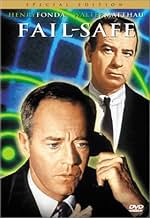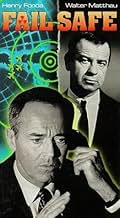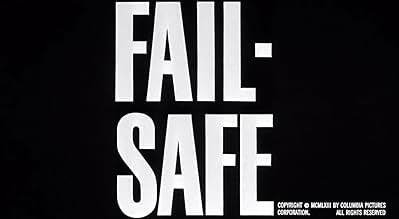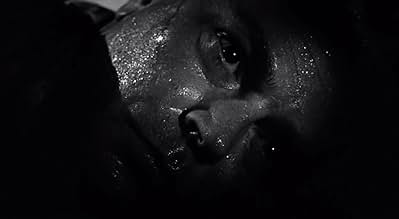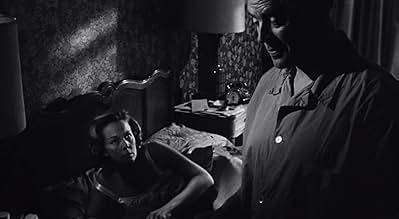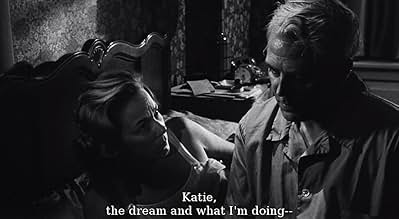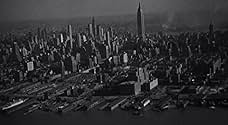Une défaillance technique envoie des avions américains à Moscou pour lancer une attaque nucléaire. Une guerre totale peut-elle être évitée?Une défaillance technique envoie des avions américains à Moscou pour lancer une attaque nucléaire. Une guerre totale peut-elle être évitée?Une défaillance technique envoie des avions américains à Moscou pour lancer une attaque nucléaire. Une guerre totale peut-elle être évitée?
- Réalisation
- Scénario
- Casting principal
- Nomination aux 1 BAFTA Award
- 3 nominations au total
Dom DeLuise
- Sgt. Collins
- (as Dom DeLouise)
Avis à la une
See "Fail- Safe."
I couldn't sleep without the light on after I saw this fantastically fabricated film. When a machine malfunctions and signals a U.S bomber to drop atomic missiles over Moscow, the Soviet Premier and the U.S President struggle to save the world from nuclear holocaust. The last three minutes are among the most powerful I've seen in a movie.
I couldn't sleep without the light on after I saw this fantastically fabricated film. When a machine malfunctions and signals a U.S bomber to drop atomic missiles over Moscow, the Soviet Premier and the U.S President struggle to save the world from nuclear holocaust. The last three minutes are among the most powerful I've seen in a movie.
I mentioned in another comment about a series of movies made during the mid-1960's, that I call 'political noir'.
These films are easy to spot, in that there were made in B&W, dealt with a American institutional crisis and seemed to always feature Henry Fonda somewhere in the cast.
On all three counts, this film fits that criteria.
Because this film came out around the time of "Dr Strangelove", it was somewhat overshadowed, and because of the nearly identical plots, there was even talk of plagiarism, even though this film was based on a novel by two Washington-based journalists with a remarkable insight of the workings of government and was directed by Sidney Lument, one of the cinema's great directors.
Also, unlike "Dr Strangelove", which seemed to receive major studio backing, money and the freedom offered by being produced in Great Britain where this satire was more appreciated, "Fail-Safe" was independently produced in New York on a limited budget, without official backing by the Defense Department, which explains all of the flaws complained of by many viewers and posters on this site.
Yet in spite of these limitations, Lument pulls off a major coup by presenting us with an authentic piece of Armeggeddon.
In a real-time view, we watch as a million-to-one technical fault 'orders' a wing of American bombers to attack Soviet Russia, and the Defense Department and the President are helpless in trying to stop it.
We are also witness to how our military operates, trying to plan military policy, and debating theory and possible results.
Such things are sensible and harmless as far as these things go, until 'the day comes' when reality displaces theory.
Walter Matthau, who is more well-known for his comic talents ("The Odd Couple", "Grumpy Old Men"), than being an accomplished dramatic actor, is shown at the height of his powers as Prof. Groteschelle; a defense policy wonk, whose obsession with defense preparedness and Marxist theory reaches the point of detachment from human emotion, as he blindly recommends that no action be taken and the bombers be allowed to complete their mission, resulting in 'final victory' over Communism.
This is in direct contradiction to General Black, a compassionate Air Force officer who is also an intellectual, who desperately urges that every means be made to stop the bombers before it is too late.
However, it turns out to be too late, at least on the American side.
We watch how technology becomes a hindrance, as much as the distrust between the two superpowers seems to be, as the President and the Soviet Premier desperately try to seek a solution to this disaster.
The tragedy about this is that someone thought they should remake this in 2000, which in a way is flattering but certainly could not come close to the original work.
But, this only proves that the subject of 'accidental war' is still a concern.
However, how can one do better than Henry Fonda ???
These films are easy to spot, in that there were made in B&W, dealt with a American institutional crisis and seemed to always feature Henry Fonda somewhere in the cast.
On all three counts, this film fits that criteria.
Because this film came out around the time of "Dr Strangelove", it was somewhat overshadowed, and because of the nearly identical plots, there was even talk of plagiarism, even though this film was based on a novel by two Washington-based journalists with a remarkable insight of the workings of government and was directed by Sidney Lument, one of the cinema's great directors.
Also, unlike "Dr Strangelove", which seemed to receive major studio backing, money and the freedom offered by being produced in Great Britain where this satire was more appreciated, "Fail-Safe" was independently produced in New York on a limited budget, without official backing by the Defense Department, which explains all of the flaws complained of by many viewers and posters on this site.
Yet in spite of these limitations, Lument pulls off a major coup by presenting us with an authentic piece of Armeggeddon.
In a real-time view, we watch as a million-to-one technical fault 'orders' a wing of American bombers to attack Soviet Russia, and the Defense Department and the President are helpless in trying to stop it.
We are also witness to how our military operates, trying to plan military policy, and debating theory and possible results.
Such things are sensible and harmless as far as these things go, until 'the day comes' when reality displaces theory.
Walter Matthau, who is more well-known for his comic talents ("The Odd Couple", "Grumpy Old Men"), than being an accomplished dramatic actor, is shown at the height of his powers as Prof. Groteschelle; a defense policy wonk, whose obsession with defense preparedness and Marxist theory reaches the point of detachment from human emotion, as he blindly recommends that no action be taken and the bombers be allowed to complete their mission, resulting in 'final victory' over Communism.
This is in direct contradiction to General Black, a compassionate Air Force officer who is also an intellectual, who desperately urges that every means be made to stop the bombers before it is too late.
However, it turns out to be too late, at least on the American side.
We watch how technology becomes a hindrance, as much as the distrust between the two superpowers seems to be, as the President and the Soviet Premier desperately try to seek a solution to this disaster.
The tragedy about this is that someone thought they should remake this in 2000, which in a way is flattering but certainly could not come close to the original work.
But, this only proves that the subject of 'accidental war' is still a concern.
However, how can one do better than Henry Fonda ???
I'm a child of the 1970s, but this movie still scared me. You didn't have to grow up during the 50s or 60s to appreciate this. Anways in the 1980s, when Reagan was in office, nuclear war seemed a very real prospect. This movie is deadly serious, NO humor at all, and lit very sparsely. The battles between Russian and US planes seen as blips on a huge screen, is just as scary as if we had seen it realistically. Frightening, harrowing...hard to believe this film still has that effect now. Well worth watching but it's very very grim. Also, Fonda is superb as the President.
Interesting that both Failsafe and Dr. Strangelove both came out in 1964 the year that Barry Goldwater and his candidacy brought up the nuclear issue. After seeing both those films together with the flip comments Goldwater made about nuclear war, he was never to be anything other than a Senator from Arizona.
Everyone remembers Stanley Kubrick's black comedy Dr. Strangelove about a nuclear exchange. Failsafe which is as serious as a crutch is less remembered. Still viewed today it still has an important message, maybe more important now than when it was a bi-polar world. At least everyone then seemed to be on one side or the other.
My favorite performer in this film is Frank Overton who worked mostly in television. On the big screen he's probably best known as the small town sheriff in To Kill A Mockingbird. Though he did a lot of television work until he died in 1967, Failsafe turned out to be his last big screen performance. Overton does a great job as the general in charge of the Strategic Air Command in Omaha who is very reluctantly trying to help the Russians shoot down SAC bombers who've had one squad of them accidentally given the go ahead for nuclear war.
Henry Fonda is the beleaguered president of the United States who is issuing commands from a deep underground bunker beneath the White House with only Russian interpreter Larry Hagman there. The whole claustrophobic atmosphere adds to the desperation of Fonda's performance. By the way note the large closeups of Fonda as he's trying to order the SAC bombers back from their mission.
You might also note in a tiny role at the SAC command center Dom DeLuise in a very serious role as a sergeant. This may be the only time DeLuise ever had a serious part.
At the Pentagon is Defense Department consultant Walter Matthau also in a serious role as a Herman Kahn type, looking to 'win' a nuclear exchange. He's one frightening fellow.
The world is no longer bi-polar, but the lessons of Failsafe have yet to be learned.
Everyone remembers Stanley Kubrick's black comedy Dr. Strangelove about a nuclear exchange. Failsafe which is as serious as a crutch is less remembered. Still viewed today it still has an important message, maybe more important now than when it was a bi-polar world. At least everyone then seemed to be on one side or the other.
My favorite performer in this film is Frank Overton who worked mostly in television. On the big screen he's probably best known as the small town sheriff in To Kill A Mockingbird. Though he did a lot of television work until he died in 1967, Failsafe turned out to be his last big screen performance. Overton does a great job as the general in charge of the Strategic Air Command in Omaha who is very reluctantly trying to help the Russians shoot down SAC bombers who've had one squad of them accidentally given the go ahead for nuclear war.
Henry Fonda is the beleaguered president of the United States who is issuing commands from a deep underground bunker beneath the White House with only Russian interpreter Larry Hagman there. The whole claustrophobic atmosphere adds to the desperation of Fonda's performance. By the way note the large closeups of Fonda as he's trying to order the SAC bombers back from their mission.
You might also note in a tiny role at the SAC command center Dom DeLuise in a very serious role as a sergeant. This may be the only time DeLuise ever had a serious part.
At the Pentagon is Defense Department consultant Walter Matthau also in a serious role as a Herman Kahn type, looking to 'win' a nuclear exchange. He's one frightening fellow.
The world is no longer bi-polar, but the lessons of Failsafe have yet to be learned.
This cold war era classic certainly made you think if it's storyline was possible. The plausibility of the solution to avert an all-out retaliatory nuclear war that the American and Soviet leaders decide on in the film is still debated but this film captures the essence of the cold war paranoia in this film directed by Sidney Lumet. This was Lumet's seventh film of his career and he was known for his dramas that were screen stage plays with 12 Angry Men, Long Days Journey Into Night and The Pawnbroker. Henry Fonda heads up an excellent cast including Walter Matthau, Fritz Weaver, Larry Hagman, Dan O'Herlihy, Ed Binns and Frank Overton. In 1958 author Peter George wrote the novel Red Alert and would go on to win an out of court settlement over the authors of Fail Safe, Eugene Burdick and Harvey Wheeler, on plagiarism charges. Interestingly the dramatic novel Red Alert would serve as the basic premise for this dramatic film and in the dark comedy Dr. Strangelove which were both released in the same year by the same studio. Good tension and drama from this script by Walter Bernstein. Weather it could or couldn't have happened as it did in this story it's still a compelling film 42 years later. I would give it an 8.5 out of 10.
Le saviez-vous
- AnecdotesThe "computer-generated" image on the control-room screen (including the map of the world, the planes and the explosions) was entirely drawn and animated by hand.
- GaffesThe end credits list General Black's wife as Betty, but in the film he addresses her as Katie and in a radio conversation, the President asks Black, "Are Kathryn and the kids in New York?"
- Citations
US Ambassador: [over the phone] I can hear the sound of explosions from the north east. The sky is very bright. All lit up.
[phone melts and high pitched whining sound starts]
- Crédits fous[FINAL CREDIT]: The producers of this film wish to stress that it is the stated position of the Department of Defense and the United States Air Force that a rigidly enforced system of safeguards and controls insure that occurrences such as those depicted in this story cannot happen
- ConnexionsFeatured in Henry Fonda: The Man and His Movies (1982)
Meilleurs choix
Connectez-vous pour évaluer et suivre la liste de favoris afin de recevoir des recommandations personnalisées
- How long is Fail Safe?Alimenté par Alexa
- What is this movie's connection to Dr. Strangelove?
Détails
- Date de sortie
- Pays d’origine
- Langues
- Aussi connu sous le nom de
- Límite de seguridad
- Lieux de tournage
- Westbury, Long Island, New York, États-Unis(Roosevelt Field: President's bunker)
- Société de production
- Voir plus de crédits d'entreprise sur IMDbPro
Box-office
- Montant brut aux États-Unis et au Canada
- 3 924 000 $US
- Durée1 heure 52 minutes
- Couleur
- Rapport de forme
- 1.85 : 1
Contribuer à cette page
Suggérer une modification ou ajouter du contenu manquant


![Regarder Trailer [OV]](https://m.media-amazon.com/images/M/MV5BZjExYTg4YzctNGIwZC00ZWUwLWFhOWItNTJhYjRiY2UzZjk4XkEyXkFqcGdeQXRyYW5zY29kZS13b3JrZmxvdw@@._V1_QL75_UX500_CR0)
